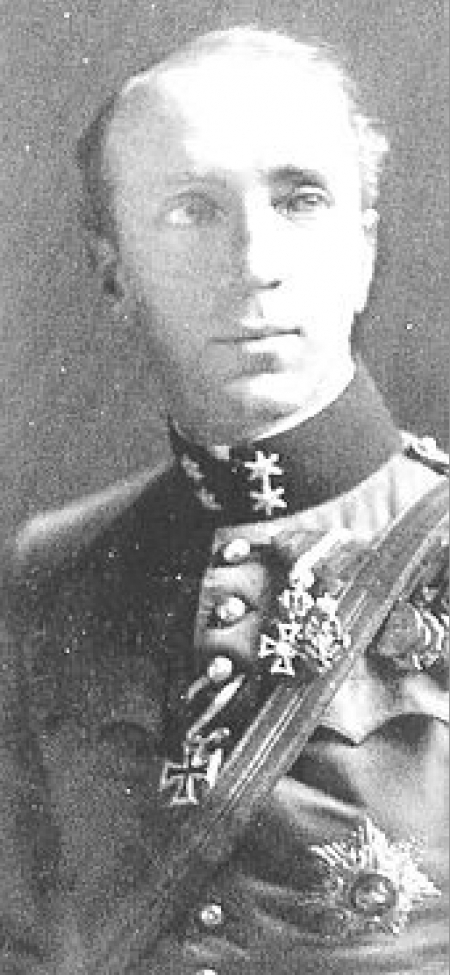Baron Georg Albert
von und zu Franckenstein
Male
Austria
1878-03-18
Dresden, Germany
1953-10-14
Kelsterbach bei Frankfurt-am-Main, West-Germany
From Wikipedia: https://en.wikipedia.org/wiki/Georg_von_und_zu_Franckenstein
Georg Franckenstein was born in Dresden, Saxony, the son of Karl Baron von und zu Franckenstein (1831-1898), a diplomat of the Austro-Hungarian Empire, and his wife, Elma, née Countess von Schönborn-Wiesentheid (1841-1884). He was the younger brother of the composer and General Intendant of Munich Clemens von und zu Franckenstein (1875-1942).
Georg spent his youth between Franconia and Vienna. Educated at the famous Schottengymnasium, followed by the study of politics and law at the University of Vienna, he joined the Ministry of Foreign Affairs of the Austrian Empire to become a career diplomat.
His first posting took him to Washington D.C., followed by the Russian imperial Court in Saint Petersburg and Rome. After a short interlude at the Ministry of Foreign Affairs in Vienna, he was ordered to the Japanese Imperial Court, then to India, and finally to Brussels, before becoming K+K Kommerzdirektor of the Austrian Embassy to the Court of St James’s, Westminster. The beginning of the First World War in 1914 forced him to leave Britain and return home.
During the First World War, Franckenstein was, inter alia, diplomatic representative of the Habsburg-Monarchy in the German-occupied territories of Belgium and in 1918 in the Caucasus, occupied by the central powers, where he tried together with his German colleague General Kress von Kressenstein to help the Armenian refugees. In 1919 he was a member of Austria’s delegation for concluding peace with the Allies at Saint-Germain.
On 13 October 1920, Franckenstein returned to London as the diplomatic representative of the new Republic of Austria. He then served as Austrian Minister to the Court of St. James’s for eighteen years, from 1920 to 1938. Due to his sumptuous and representative style of living, especially the hosting of concerts and masked balls, he consolidated his reputation in high society, where – although the aristocracy had been abolished in Austria by 1919 – he was still addressed as ‘Baron Franckenstein’.
In the early 1920s he was able to clear the massive debt of his country, thanks to his contacts in London and through arranging an international Government Bond.
In 1935, he was awarded an honorary degree by the University of Oxford. Being an opponent of the Nazis, he lost his diplomatic position after the Anschluss of 1938. In order to organize the fight against the Nazis outside Britain and help anti-Nazi countrymen, he remained in London, took British nationality on 14 July 1938, and was knighted on 26 July 1938 by King George VI. He became a Knight of the Grand Cross of the Royal Victorian Order.
Together with his brother Clemens, his cousins Joseph von Franckenstein, an active intelligence and field agent at the OSS, and Heinrich von Franckenstein, he tried to keep up an active network and opposition against the Nazi regime from London. Unlike networks of some occupied countries, this activity was not successful, as the majority of Austrians at the time identified themselves as German.
In 1939, he married young Editha King, and they had one son, Clement. George and Editha were among 44 people killed in a plane crash in Kelsterbach, Hessen, close to Frankfurt, on 14 October 1953. Their son, Clement (1944–2019), an actor, was then raised by family friends.

1898 - 1914
0
15
5
Round 1
Sidney Johnson Watts 1 *
Georg Franckenstein
w.o.
Round 2
Tony Wilding 1 *
Georg Franckenstein
6-1
6-0
Round 1
N. Scott 1 *
Georg Franckenstein
w.o.
Round 2
Kreigh Collins 1 *
Georg Franckenstein
6-0
6-1
6-0
Round 1
Georg Franckenstein 1 *
François Jacobus Pijnacker Hordijk
6-2
6-2
Round 2
Curt von Wessely 1 *
Georg Franckenstein
6-1
6-4
Round 2
W.S. Thomson 1 *
Georg Franckenstein
6-0
7-5
Round 1
Georg Franckenstein 1 *
Edgar L. Von Spiegl
6-4
6-3
Round 2
Georg Franckenstein 1 *
Friedrich von Lerch
6-2
6-0
7-5
Quarterfinals
Rudolf Pummerer 1 *
Georg Franckenstein
6-2
6-4
Round 1
James Powell 1 *
Georg Franckenstein
6-4
6-3
Round 1
Ernest Herbert Blyth 1 *
Georg Franckenstein
6-3
3-6
6-3
Round 1
Georg Franckenstein 1 *
Sir Mansfeldt de Cardonnel Findlay
6-3
0-6
6-1
Semifinals
Georg Franckenstein 1 *
W. Williams
6-0
6-4
Final
Thomas H. Nash 1 *
Georg Franckenstein
6-2
6-0